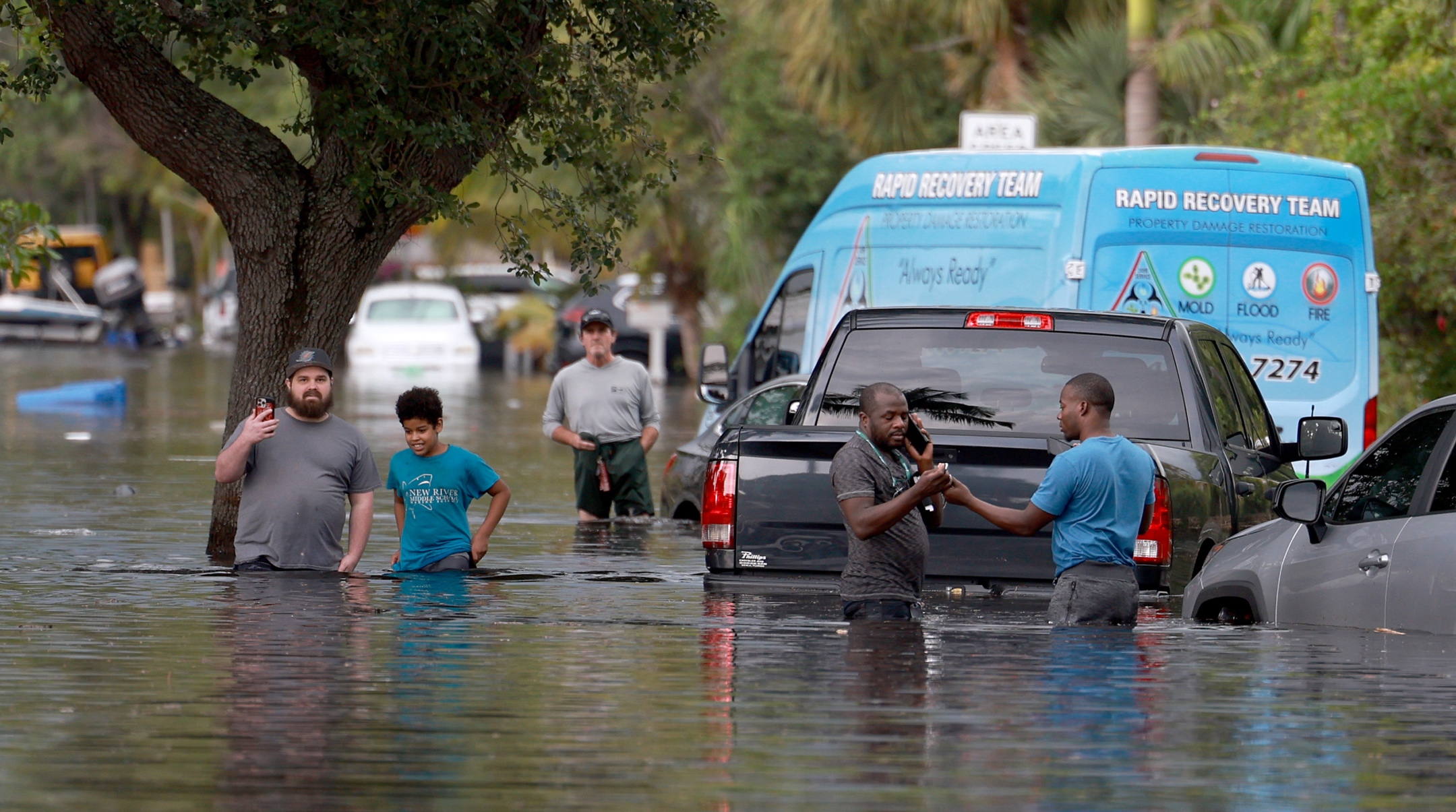Historic flooding complicates the journey home for Passover vacationers in South Florida
Families from across the United States who prefer Passover getaway packages to scrubbing the house clean of hametz were stranded in Fort Lauderdale after the rains

People walk through a flooded neighborhood in Fort Lauderdale, Florida, April 13, 2023. (Joe Raedle/Getty Images)
(JTA) — Zachary Ottenstein didn’t expect to bond with his dad over chess and classic rock during his trip home from Florida at the end of Passover.
But when Ottenstein switched his phone on after the holiday ended last night, it blew up: Fort Lauderdale was flooded and flights out of the airport — including their flight to New York — were canceled. The city was underwater after the rainiest day in its history.
He consulted with his dad, Matthew: They had enjoyed their Passover week at a hotel, but they wanted to get home in time for Shabbat the following evening.
“We really didn’t fancy staying another two days and finding a place to stay and food,” he said.
Their story was not unique: Families from across the United States who opt for Passover getaway packages in the Sunshine State found themselves stranded in Fort Lauderdale after the rains Thursday. Travelers to the airport reported seeing the headlights of cars sitting deep in water, accumulating since about a month’s worth of rain fell in an hour on Wednesday.
Traditionally observant Jews, who don’t drive or fly in planes on Shabbat, faced the prospect of either making it home before Friday at sundown, or spending at least two more days — until Saturday at nightfall — in the Fort Lauderdale area, without the institutional infrastructure that had enabled their Passover vacations.
At first, the Ottensteins looked for other flights, expanding the radius outward from Fort Lauderdale with each search. Finally, they found a barely workable option.
“There were no flights really other than one flight out of Tampa that was going to Chicago and from there, there was a flight to New York,” Ottenstein said.
They booked the flight, rented a car, left Fort Lauderdale at 10:30 p.m. and rolled into Tampa at 3 a.m. — right in time for the 5 a.m. flight to Chicago.
Others opted to stay down south for Shabbat. Mendel Fayershteyn, a Chabad rabbi in the city, put out the word in the community that he was ready to assist any families stranded at the airport.
As it turns out, there were a handful — about six or seven, he said in an interview — and he delivered kosher meals to them and found homes for them to stay in through Sunday, when the airport is expected to be back to capacity. One of the homes was his own — he decamped to his in-laws’ and handed the keys of his house to one of the airport families.
The relief he administered to the stranded Jews, Fayershteyn said, was mostly psychological.
“It was more like, people were panicking, it wasn’t like an emergency,” he said in an interview. “I would say it was more therapeutic just for the people to hear it’s going to be OK.”
Fayershteyn learned to coordinate relief during years of hurricane seasons: He put that experience to use, gathered generators and kosher food, and helped people find shelter. He also helped reunite people with cars that had floated away in the flooding.
“The main thing we were doing today is just helping people getting their cars back,” he said.
As soon as Passover ended on Thursday night, Fayershteyn got the word out on Facebook that he was offering help to Shabbat-observant Jews.
“Stay safe, and if you are in need of assistance please don’t hesitate to reach out,” the message said. “Hot Shabbat meals going out tomorrow for those that need, please DM us.”
Ottenstein also took to Facebook, posting a selfie of himself and his dad in the car after midnight. “What do you do when Fort Lauderdale airport gets closed and you want to get home for shabbos?” he wrote. “Obviously you drive through the night to Tampa to make an early morning flight home.”
Ottenstein, 24, a schoolteacher on Staten Island, and his dad, 60, a law librarian in suburban New Rochelle, filled the time up.
“The world chess championships are going on and my dad’s been very into it. He can talk for hours about that type of thing,” he said. “And we bond a lot over music. My dad’s a big 60s, 70s classic rock kind of guy.”
Zachary did the driving. “My dad doesn’t like driving at night,” he said. “No bathroom breaks, no stopping for food. The adrenaline kicked in. It was the kind of plan that was so crazy, it worked.”
This article originally appeared on JTA.org.

















